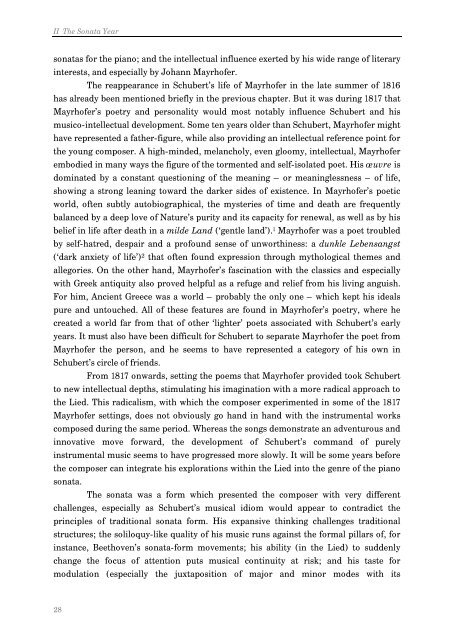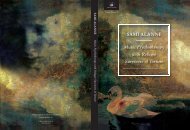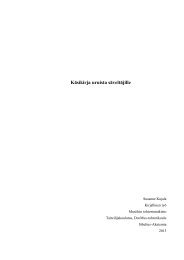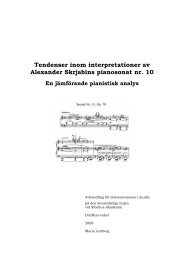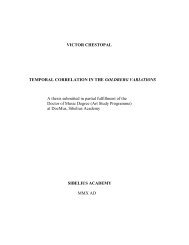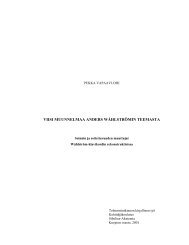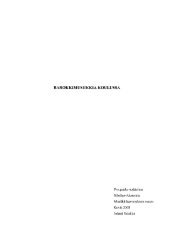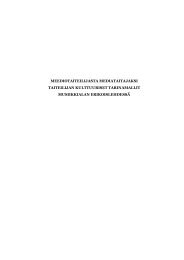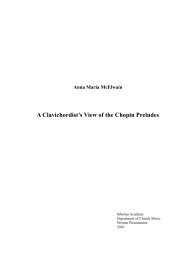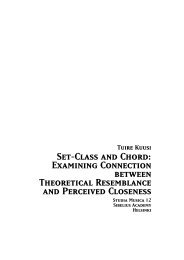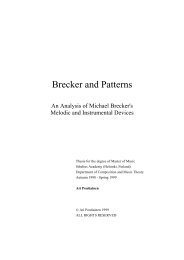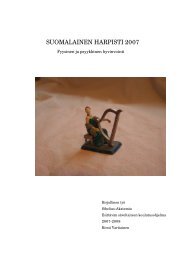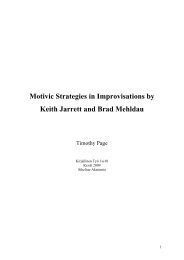The Unfinished Piano Sonatas of Franz Schubert Javier ... - Ethesis
The Unfinished Piano Sonatas of Franz Schubert Javier ... - Ethesis
The Unfinished Piano Sonatas of Franz Schubert Javier ... - Ethesis
Create successful ePaper yourself
Turn your PDF publications into a flip-book with our unique Google optimized e-Paper software.
II <strong>The</strong> Sonata Year<br />
sonatas for the piano; and the intellectual influence exerted by his wide range <strong>of</strong> literary<br />
interests, and especially by Johann Mayrh<strong>of</strong>er.<br />
<strong>The</strong> reappearance in <strong>Schubert</strong>’s life <strong>of</strong> Mayrh<strong>of</strong>er in the late summer <strong>of</strong> 1816<br />
has already been mentioned briefly in the previous chapter. But it was during 1817 that<br />
Mayrh<strong>of</strong>er’s poetry and personality would most notably influence <strong>Schubert</strong> and his<br />
musico-intellectual development. Some ten years older than <strong>Schubert</strong>, Mayrh<strong>of</strong>er might<br />
have represented a father-figure, while also providing an intellectual reference point for<br />
the young composer. A high-minded, melancholy, even gloomy, intellectual, Mayrh<strong>of</strong>er<br />
embodied in many ways the figure <strong>of</strong> the tormented and self-isolated poet. His œuvre is<br />
dominated by a constant questioning <strong>of</strong> the meaning – or meaninglessness – <strong>of</strong> life,<br />
showing a strong leaning toward the darker sides <strong>of</strong> existence. In Mayrh<strong>of</strong>er’s poetic<br />
world, <strong>of</strong>ten subtly autobiographical, the mysteries <strong>of</strong> time and death are frequently<br />
balanced by a deep love <strong>of</strong> Nature’s purity and its capacity for renewal, as well as by his<br />
belief in life after death in a milde Land (‘gentle land’). 1 Mayrh<strong>of</strong>er was a poet troubled<br />
by self-hatred, despair and a pr<strong>of</strong>ound sense <strong>of</strong> unworthiness: a dunkle Lebensangst<br />
(‘dark anxiety <strong>of</strong> life’) 2 that <strong>of</strong>ten found expression through mythological themes and<br />
allegories. On the other hand, Mayrh<strong>of</strong>er’s fascination with the classics and especially<br />
with Greek antiquity also proved helpful as a refuge and relief from his living anguish.<br />
For him, Ancient Greece was a world – probably the only one – which kept his ideals<br />
pure and untouched. All <strong>of</strong> these features are found in Mayrh<strong>of</strong>er’s poetry, where he<br />
created a world far from that <strong>of</strong> other ‘lighter’ poets associated with <strong>Schubert</strong>’s early<br />
years. It must also have been difficult for <strong>Schubert</strong> to separate Mayrh<strong>of</strong>er the poet from<br />
Mayrh<strong>of</strong>er the person, and he seems to have represented a category <strong>of</strong> his own in<br />
<strong>Schubert</strong>’s circle <strong>of</strong> friends.<br />
From 1817 onwards, setting the poems that Mayrh<strong>of</strong>er provided took <strong>Schubert</strong><br />
to new intellectual depths, stimulating his imagination with a more radical approach to<br />
the Lied. This radicalism, with which the composer experimented in some <strong>of</strong> the 1817<br />
Mayrh<strong>of</strong>er settings, does not obviously go hand in hand with the instrumental works<br />
composed during the same period. Whereas the songs demonstrate an adventurous and<br />
innovative move forward, the development <strong>of</strong> <strong>Schubert</strong>’s command <strong>of</strong> purely<br />
instrumental music seems to have progressed more slowly. It will be some years before<br />
the composer can integrate his explorations within the Lied into the genre <strong>of</strong> the piano<br />
sonata.<br />
<strong>The</strong> sonata was a form which presented the composer with very different<br />
challenges, especially as <strong>Schubert</strong>’s musical idiom would appear to contradict the<br />
principles <strong>of</strong> traditional sonata form. His expansive thinking challenges traditional<br />
structures; the soliloquy-like quality <strong>of</strong> his music runs against the formal pillars <strong>of</strong>, for<br />
instance, Beethoven’s sonata-form movements; his ability (in the Lied) to suddenly<br />
change the focus <strong>of</strong> attention puts musical continuity at risk; and his taste for<br />
modulation (especially the juxtaposition <strong>of</strong> major and minor modes with its<br />
28


